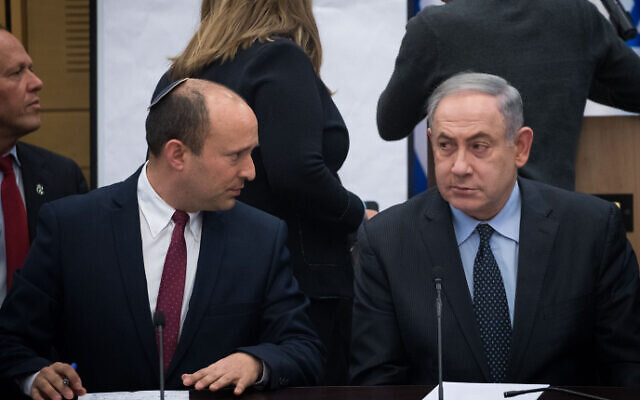Facing growing anger from his right flank, PM appears to retreat from agreement, but compromises have been reached on all key issues — except West Bank annexation
By Haviv Rettig Gur, TOI Today, 12:31 am
Composite photo shows Prime Minister Benjamin Netanyahu, left, and Blue and White party chief Benny Gantz, right. (Flash90)
On Tuesday, Likud and Blue and White officials believed their unity government deal was all but sealed.
Netanyahu and Gantz each needed the other: Gantz had no centrist alliance to return to, Netanyahu lacked the votes to oust Gantz as Knesset speaker, a position from which Gantz could make Netanyahu’s next government essentially unable to govern.
On Wednesday, that notion seemed to unravel.
It took a few days for Netanyahu’s right-wing camp to realize the extent of his promises to Gantz, including not only an unprecedentedly generous 15 ministers (for perhaps 19 MKs — Gantz’s Blue and White, two Labor MKs and two from the new Derech Eretz splinter group), but also control over the defense and justice ministries, granting Gantz a de facto veto over the right’s most important policy aspirations.
Once they noticed, the rebellion came fast and furious.

Defense Minister Naftali Bennett of Yamina, left, and Prime Minister Benjamin Netanyahu during a meeting of right-wing parties, March 4, 2020. (Yonatan Sindel/Flash90)
Right-wing Yamina threatened to leave the coalition “rather than sit in a leftist government” — that is, a government that won’t carry out a West Bank annexation or push conservative judicial and legal reforms. It also protested Blue and White’s lavish ministerial haul while Yamina’s six legislators would be lucky to receive two cabinet posts between them.
The rebellion extended deep into Likud as well. Former Knesset speaker Yuli Edelstein was livid that Netanyahu had agreed to Gantz’s demand to remove him from the speakership as punishment for his defying a High Court order last week to hold a vote on his replacement. Some of Edelstein’s closest allies in the party even warned they would begin a campaign to support Blue and White’s laws to oust an indicted Netanyahu from the premiership, as one told Zman Israel’s (The Times of Israel’s Hebrew-language sister site’s) Shalom Yerushalmi.
A letter signed by top activists, including the heads of local Likud branches, demanded that Netanyahu “not surrender the right’s principles to establish a government with Blue and White. And if necessary, go to a fourth election.”
The pressure started to affect Netanyahu, leading him to add new and dramatic stipulations on Wednesday in a bid to assuage the right — and to make it difficult for his aggrieved allies to withdraw their support.
Likud suddenly announced a laundry list of new demands, or rediscovered former demands dropped by the wayside during the talks. They included a veto over the next justice minister’s appointments – that is, a Likud veto on the long list of candidates Blue and White would be nominating in the coming government’s term, from the state attorney and attorney general to at least six Supreme Court justices.

The West Bank. (Israel Policy Forum)
But the heart of Netanyahu’s solution to his predicament – and the last sticking point late Wednesday as the two parties’ negotiators prepared to meet into the night – was over annexation in the West Bank.
Likud began on Wednesday to publicly demand that Gantz agree to annex at least part of the West Bank within the next six months – and to drop Gantz’s vague demand from the campaign that some form of “international agreement” precede such a move.
Netanyahu had a powerful argument for his six-month timeline, one calculated to instill a sense of urgency on the right. As he explained to fellow Likud leaders, the next six months “could see the window close” on the possibility of annexation because US President Donald Trump may not be reelected in November.
The sudden hardening of positions turned the all-but-certain unity government into a frozen and uncertain stalemate — a stalemate that Gantz’s abandoned center-left allies insisted proved Netanyahu’s intentions had been dishonest from the start.
As anti-Netanyahu activist Eldad Yaniv put it in a viral Facebook video addressed to Gantz, “So he lied to you. You’re not the first. You’re not stupid. He’s lied to you, he’s lied to everybody. It was just your turn. That’s the whole story. Nothing happened…. You don’t have to fall with him to the abyss. You understand now that he won’t let you run anything alongside him. Pick up the phone to Yair [Lapid] and tell him you made a mistake. It happens in the best families. You’ll stay Knesset speaker, [Yesh Atid MK] Ofer Shelah will stay [chair] of the corona[virus] committee. The finance committee is ours. The best thing for Israel… is for Netanyahu to run the government, we’ll run the Knesset, we will supervise every move he makes, and in a few months we’ll see where we all stand.”

Yair Lapid (left) and Benny Gantz speak to supporters in Tel Aviv, on February 20, 2020. (Tomer Neuberg/Flash90)
There was no doubt the talks had reached a crossroads. What was less clear was whether Netanyahu’s new belligerence was a negotiating tactic meant to quiet his rightist flank and strengthen his hand for the final round of negotiations — and thus a sign that an agreement was imminent — or an attempt to jettison Gantz in favor of his more dependable right-wing allies.
Gantz himself wasn’t sure. Blue and White began to brief reporters on Wednesday afternoon with veiled threats aimed at reminding Netanyahu what was at stake. “We want to form an emergency government, but not at any price,” one official told the Yedioth Ahronoth daily. “If Netanyahu doesn’t move ahead with the talks, within days we’ll get back to the legislation against him,” another told Channel 12.
Could Blue and White, now shrunken to just 15 MKs, really afford to sit out the next government, having parted ways with former allies Yair Lapid and Moshe Ya’alon and most of their MKs? Could it carry out its threat to pass legislation that would prohibit an indicted MK like Netanyahu from serving as prime minister?
Netanyahu had the advantage. His rallying cry of “annexation” made it hard for his right-wing allies to now abandon him to Gantz’s mercies. He’d already promised Gantz a veto on all major right-wing policies, but faced with a right-wing rebellion began to wonder if Gantz would bend. The Blue and White leader’s overarching priority was to bring political stability to a nation reeling from the coronavirus crisis; would he risk yet another election in the middle of that crisis?

Benny Gantz delivers his maiden speech as Knesset speaker, March 26, 2020. (Knesset)
Meanwhile, Gantz’s threat to use the Knesset to prevent Netanyahu’s return to the Prime Minister’s Office is rich with irony.
Gantz appears to believe, or at least pretended on Wednesday, that he can rely on his former anti-Netanyahu coalition to advance bills against Netanyahu – but as a means to bolster his own leverage in unity talks whose successful conclusion would ultimately safeguard Netanyahu from that very coalition. Gantz had unceremoniously abandoned that alliance just last Thursday. If they are condemned to suffer Netanyahu in either case, wouldn’t Yesh Atid, Yisrael Beytenu et al prefer to at least let Gantz hang in the wind as punishment for that betrayal?
The talks between the two men were as close to failure on Wednesday as they could get without actually failing. But it’s hard to see a path to success in any talks between such deeply opposed politicians and personalities that doesn’t pass through a final obstinate showdown.
Gantz has done an able job as a tactician – taking the Knesset speaker post, forcing Netanyahu into fundamental policy concessions early on to establish an uncomfortable narrative (for Netanyahu) of equal partnership, and, so far at least, not blinking at Netanyahu’s backtracking and new demands.
Netanyahu, meanwhile, the more experienced and unabashedly predatory of the two, adapted quickly, found his formula for preserving his right-wing base and forced a few marginal compromises on the Blue and White leader.

Prime Minister Benjamin Netanyahu holds a press conference at the Prime Minister’s office in Jerusalem on March 16, 2020. (Yonatan Sindel/Flash90)
For example: Gantz has for the moment refused to concede his right to appoint MK Avi Nissenkorn as justice minister, but consented to a Likud-appointed deputy justice minister serving under him. The fate of the upcoming appointments is not yet clear. Gantz, in return, received a deputy minister position under a Likud public security minister, which is responsible for the police.
One senior Likud official expressed a cautious optimism on Wednesday night – the first such optimism one could glean from top officials of any party throughout the day. Netanyahu and Gantz were hoping to clinch an agreement overnight Wednesday-Thursday, as talks between their respective negotiating teams extend into the night, the official said.
Speaking with The Times of Israel, the official insisted “both want to seal the deal. I hope they succeed. The main problem now is annexation.”




Gantz told Trump he would do the deal of the century. Now he backtracks. Is he really Israeli?